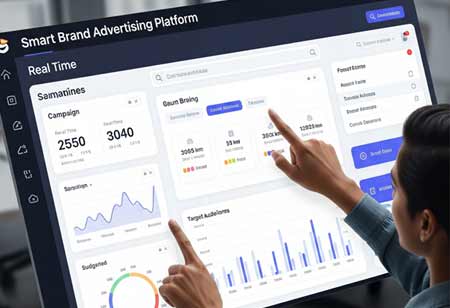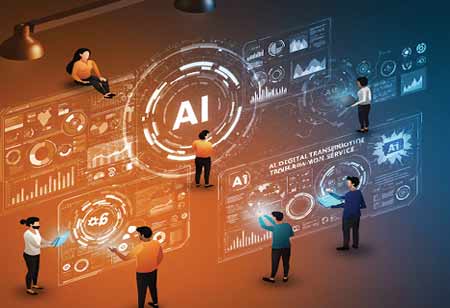THANK YOU FOR SUBSCRIBING
Shifting Energy Landscape: Upskilling for a Sustainable Future
Environmental imperatives, technological progress, and evolving policy frameworks motivate the transition from fossil fuels to renewable energy sources

By
Apac CIOOutlook | Monday, March 04, 2024
Stay ahead of the industry with exclusive feature stories on the top companies, expert insights and the latest news delivered straight to your inbox. Subscribe today.
Renewable energy transition is driven by environmental concerns, technological advancements, and policy changes. Solar energy contributed 54% to new capacity in Q1 2023. Upskilling opportunities and staffing solutions are crucial.
FREMONT, CA: Environmental imperatives, technological progress, and evolving policy frameworks motivate the transition from fossil fuels to renewable energy sources. This transition seeks to mitigate climate change, bolster air quality, and fortify energy resilience. Advancements in technology have notably enhanced the efficiency of renewable energy solutions, while policy adjustments are reorienting subsidies toward renewable energy ventures. Forecasts anticipate the generation of numerous employment prospects across clean energy production, energy efficiency, automotive advancements, and sustainable infrastructure development. Consequently, this shift engenders significant implications for staffing and recruitment within the energy sector, necessitating strategic approaches for demand analysis, technology integration, and workforce cultivation.
Understanding renewable energy transition
The renewable energy sector is experiencing a remarkable surge, evident in the substantial growth of global renewable power capacity, which escalated by 9.6% in 2022, reaching a commendable 3,372 GW.
In the coming years, the trajectory is promising, with global renewable electricity capacity forecasted to skyrocket by over 80 percent by 2026, primarily propelled by advancements in wind and solar technologies. Nevertheless, this transition from fossil fuels to renewable energy is accompanied by shifting workforce dynamics. According to the International Energy Agency, the fossil fuel sector is anticipated to witness a decline of 5 million jobs by 2030. However, amidst these changes, new avenues for employment are emerging within the renewable energy sectors. Many skills honed in the fossil fuel industry are transferable to these burgeoning roles, underscoring the adaptability and resilience of the labor force in navigating this transition.
Navigating Workplace Skill Development in Renewable Energy
The shift towards renewable energy sources generates a wealth of upskilling opportunities, facilitating the cultivation of employment competencies and bridging the disparity between current workforce proficiencies and the evolving demands of the sector. Tailored training initiatives, developed through collaborative endeavors with academic institutions, provide a blend of theoretical foundations and practical expertise, catering to diverse learning preferences and professional backgrounds. This transition nurtures a learning milieu, promoting continual skill enhancement and adaptability.
The migration from fossil fuels to renewable energy avenues presents substantial avenues for leveraging existing skill sets into new domains. Crucial transferable proficiencies from the fossil fuel sector encompass project management, machinery operation and maintenance, safety and environmental adherence, workforce training and development, resource management and logistics, and public administration and policy.
Governments, educational entities, corporations, and non-governmental organizations are joining forces to equip workers with the requisite skills for the renewable energy landscape. This collaborative effort entails the implementation of supportive policies, incentivizing mechanisms, specialized training schemes, corporate alliances, job placement initiatives, and cultivating a diverse talent reservoir. These collective endeavors are geared towards fostering a more sustainable and technologically proficient industry landscape.
Implications for Staffing and Recruitment in the Renewable Energy Sector
The shift towards sustainable energy solutions has resulted in a heightened demand for professionals possessing specialized expertise in sustainable technologies and practices. Recruitment agencies diligently seek candidates with hands-on experience in green technologies, renewable energy, and project management geared toward sustainability. Furthermore, agencies must establish comprehensive training and development initiatives to equip existing personnel with the requisite skills to navigate the landscape of new technologies and methodologies in green energy.
To effectively address the evolving needs of the energy sector, strategic staffing solutions should be devised, aligning with the industry's demands. This may involve offering temporary, contract-based, or project-specific staffing solutions. Collaborative partnerships with educational institutions are indispensable for shaping curricula and establishing internship and apprenticeship programs. Critical components of successful recruitment strategies encompass promoting career transition opportunities, integrating sustainability into core values, and adopting adaptive approaches.
Recognizing the global nature of the talent pool, agencies must extend their reach to access international talent. A paramount emphasis should be placed on continuous learning and fostering diversity in the hiring process. Internally, a focus on workforce development within the renewable energy sector is imperative. This involves identifying emerging skill sets, forging partnerships with educational institutions, investing in reskilling and upskilling programs, creating internships and apprenticeships, utilizing data analytics, cultivating a culture of continuous learning, expanding the talent pool, implementing effective retention strategies, engaging with local communities, incorporating fair and inclusive hiring practices, and leveraging recruitment agencies like VBeyond Corporation to streamline the hiring process for renewable energy roles.
The transition to clean energy holds profound implications for workforce development and recruitment strategies within the energy sector. As the industry increasingly prioritizes renewable energy technologies, energy efficiency, and sustainable practices, there is a growing demand for professionals with specialized skills in these areas.
This evolution underscores the importance of fostering a workforce characterized by adaptability and a commitment to continuous learning. Professionals must continuously update their knowledge and skill sets to remain competitive in a landscape marked by rapid technological advancements and shifting industry dynamics.
Continuous learning and adaptability are indispensable traits in this rapidly transforming energy market. To remain relevant, professionals must stay abreast of the latest developments in green technologies, industry trends, and regulatory frameworks. Lifelong learning sustains competitiveness in the job market and fosters the ability to devise innovative solutions and think critically about complex challenges.
From a recruitment standpoint, the shift toward clean energy reinforces the need for continuous reskilling and upskilling to meet the demands of the evolving economy. This necessitates acquiring competencies pertinent to renewable energy systems, innovative grid technologies, and advancements in energy efficiency.
While the transition may result in the phasing out of specific traditional energy roles, it also presents a significant opportunity for creating millions of new jobs in the renewable energy field. Professionals who demonstrate adaptability and a commitment to lifelong learning will be well-positioned to capitalize on these emerging employment opportunities.





